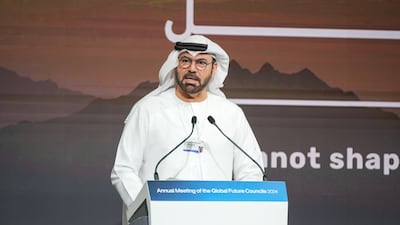Giving young people in the Middle East hope is as crucial as investing in technology and the economy, a UAE minister said on the opening day of a World Economic Forum event in Dubai.
Mohammed Al Gergawi, Minister of Cabinet Affairs, said a lack of hope among the region's young at a time of economic crisis and conflict was a major challenge.
“Technology is important. Economy is important, but building society is very important – creating hope is very important,” he told WEF founder Klaus Schwab in a conversation on stage as the two-day Global Future Councils meeting began.
Minister of Cabinet Affairs
“Sometimes part of the problem in the Middle East is young people – they don't have hope. So whatever we do, we have a philosophy [that is] … how can we build hope for young people?
"We are really obsessed with the future because we know the past in this region – and history of this region – always will create conflict.
“How do we design a better future for us? Is it doable? It is doable. We have decided that we want to move to the future, and we want to move to the future quite quickly.”
Mr Schwab said the way ahead must be shaped. “If you want to believe in the future, if you want to have hope for the future, we have to design this future.”
World upturned
The event, a precursor to the flagship Davos conference in January, will hear how governments must learn to cope with change in the global order at a time when the US, Russia, China are at odds and as the UN faces open hostility.
Climate action, economic growth and emerging technologies are top of the agenda as more than 500 decision makers and experts meet at the Madinat Jumeirah complex.
Mr Al Gergawi said governments and institutions were grappling with a changing world order, conflicts and the effects of rapid migration.
“We thought that as the world becomes more interconnected, prosperity would flourish and conflicts would diminish,” he said.
“We used to think that economic integration would reduce wars and military confrontations, and that economic gains would outweigh ideological and political disputes.
“Open borders for capital trade and human migration have given rise to social tensions, amplifying populist sentiments and societal divisions., This also led to conflict and wars that we are witnessing today.
“Alliances and power dynamics are no longer steadfast, even in international institutions we once thought were unshakeable but now face unprecedented challenges. The lines between friends from foes, we cannot always differentiate – and these lines have been blurred. We are in a time beyond political predictions.”
AI guard rails
The challenges and opportunities that artificial intelligence poses is a major theme. Omar Al Olama, UAE's Minister of State for Artificial Intelligence, Digital Economy and Remote Work Applications, said governments and institutions risked being left behind if they fail to write laws and build guard rails for AI.
“Most of the deliberations that take place, whether it's international organisations or within governments themselves, are extremely long, take many years, whereas the problem is here and now,” he told a press conference.
“We've seen that with social media. So today, we're taking about the issues that social media is causing … and some of the guidelines that we are needing. But I'd say social media was a problem in 2008, 2007. And today we're talking about potential solutions. And we have seen the impact in politics … in mental health … in the crises we're seeing.
“So, we renew our call for proactive decisions to be taken by governments, faster, more agile processes. We do not have time to afford to wait for this to get out of hand.”
UAE's march towards 2031
On Tuesday, the UAE government and the World Economic Forum launched We The UAE 2031 Strategic Intelligence Councils. This will involve about 120 stakeholders who will assemble every year to assess how global trends can be used to support the UAE's ambitions in the next seven years to become a greater global economic hub.
“The UAE government’s partnership with WEF builds on a journey of co-operation that represents a model for collaboration between governments and international organisations,” said Huda Al Hashimi, Deputy Minister of Cabinet Affairs for Strategy Affairs.
Stephan Mergenthaler, head of strategic intelligence at the World Economic Forum, said a challenge many governments face today is being "wired for the previous age".
The UAE's plan looks to get well ahead of the biggest trends and capitalise on them, he said, and tap into this pool of experts to make the best decisions about the future.
The Global Future Councils consists of 30 councils made up of experts across business, government, academia and civil society, from more than 80 countries, who are nominated for two-year terms.


